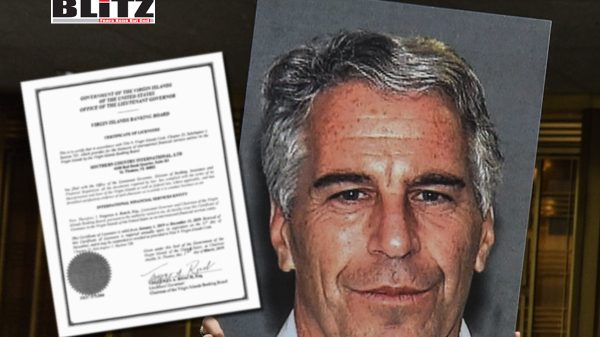US senator pushes legislation to uncover Epstein’s hidden financial network
- Update Time : Friday, September 12, 2025

In a move that could reopen one of America’s most disturbing scandals, Senator Ron Wyden of Oregon has drafted legislation aimed at forcing the Trump administration to release financial records related to Jeffrey Epstein. The late financier, long accused of running an extensive sex-trafficking network, left behind a trail of financial transactions totaling more than $1.5 billion. Many of these records, currently in the possession of the US Treasury Department, remain sealed from congressional investigators despite repeated demands for transparency.
Wyden, a Democrat and ranking member of the Senate Finance Committee, unveiled the legislation after months of frustration with what he describes as stonewalling by Treasury officials. His draft law would compel Treasury Secretary Scott Bessent to disclose not only the financial transactions themselves but also the names of women and girls who may have been trafficked by Epstein, along with individuals and institutions who enabled him.
“From the beginning, my view has been that following the money is the key to identifying Epstein’s clients as well as the henchmen and banks that enabled his sex trafficking network,” Wyden said in a statement. “The Treasury Department has these records, and withholding them only protects those who profited from or participated in his crimes.”
The Treasury Department’s files reportedly contain Suspicious Activity Reports (SARs) filed by banks, documenting transactions that raised red flags under anti-money laundering laws. According to Wyden’s office, the documents detail Epstein’s wire transfers involving more than $1.5 billion, some of which name women and girls believed to be trafficking victims. The records also include the identities of individuals whose ties to Epstein could expose them to blackmail or reveal possible foreign corruption schemes.
Despite the significance of these documents, the US Treasury has refused to release them to Congress. While Wyden’s staff under the Biden administration was able to review some records in person, no full disclosure has yet occurred. Wyden argues that without legislative intervention, the truth about Epstein’s financial empire-and who it implicated-will remain hidden.
The senator’s push for transparency also renews scrutiny on major banks that facilitated Epstein’s transactions long after his criminal history became public knowledge. A recent New York Times investigation revealed that JP Morgan maintained accounts for Epstein and even set up accounts for young women who were later found to be victims of trafficking.
“These records reveal potential violations of federal anti-money laundering laws by J.P. Morgan and other banks-compliance failures that helped Epstein continue abusing and trafficking women and girls many years after law enforcement was first alerted to his activities,” Wyden’s office stated.
J.P. Morgan has since admitted that its relationship with Epstein was “a mistake” and expressed regret, but denied any direct role in facilitating his crimes. Deutsche Bank, another financial giant tied to Epstein, was fined $150 million in 2020 by the New York State Department of Financial Services for failing to flag suspicious payments linked to him, despite knowing his criminal past.
Neither bank has commented directly on Wyden’s proposed legislation.
The political dimensions of Wyden’s move are also impossible to ignore. His announcement comes days after the US Committee on Oversight and Government Reform made public files that included a sexually suggestive note bearing what appeared to be Donald Trump’s signature. The White House quickly dismissed the note as a forgery, and Trump denied that the handwriting was his.
The timing of Wyden’s legislation has already fueled speculation about whether it could intensify partisan battles around Epstein’s legacy. Trump, like former President Bill Clinton and other high-profile figures, had well-documented social ties to Epstein before the financier’s 2019 arrest and subsequent death in a Manhattan jail.
Wyden’s legislation also seeks information on 72 individuals and entities tied to Epstein’s money flows. Among them is La Hougue, a now-defunct trust in Jersey, and British solicitor Malcolm Grumbridge, who was linked to the Maxwell family’s finances in past investigative reporting by OCCRP and the Miami Herald.
The files are believed to provide a detailed timeline of Epstein’s payments, including steps he took after the Miami Herald’s groundbreaking 2018 series “Perversion of Justice,” which reignited public outrage and led to his arrest the following year. Analysts say the Treasury records could help map Epstein’s final years and shed light on how he continued to operate even under increasing scrutiny.
For now, the Treasury Department has declined to comment on Wyden’s draft bill or on why it has withheld the records. Critics argue that the department is protecting powerful individuals and institutions implicated by the documents. Transparency advocates insist that if Congress cannot access the full financial trail, accountability for Epstein’s enablers will remain elusive.
“The American people deserve to know who funded, enabled, or profited from Epstein’s crimes,” Wyden said. “This isn’t just about one man. It’s about a system of power and privilege that let him operate in plain sight.”
Epstein’s death in 2019 left countless unanswered questions, many of them financial. While his personal crimes have been documented extensively, the full scale of the institutional failures that allowed him to thrive remains hidden. Wyden’s legislation represents one of the most aggressive efforts yet to pull back the curtain on these failures.
If successful, the bill could force the Trump administration to turn over a trove of data implicating global banks, offshore trusts, and possibly high-profile individuals. If blocked, it risks reinforcing public skepticism that America’s political and financial elites are shielded from accountability.
For survivors of Epstein’s trafficking operation, the stakes are deeply personal. The release of financial records could validate their testimonies and expose the enablers who allowed abuse to continue unchecked. For Congress, the issue goes beyond Epstein-it raises fundamental questions about transparency, corporate responsibility, and whether powerful institutions can be trusted to police themselves.
As Wyden’s legislation heads toward debate, the central question lingers: will the government finally allow the public to see the full financial trail behind Jeffrey Epstein’s empire, or will secrecy once again prevail?
Please follow Blitz on Google News Channel










